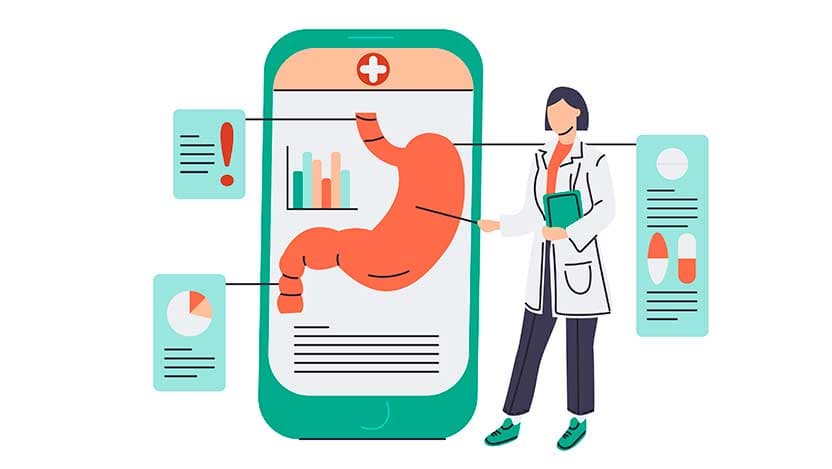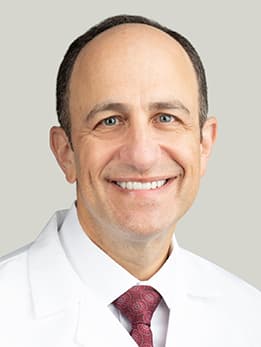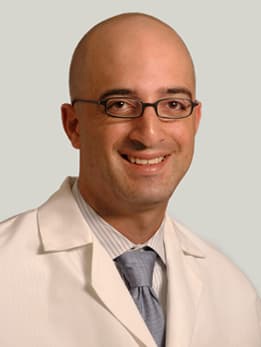New wearable devices, drugs and at-home monitoring: What the future holds for people with IBD

Wearable devices that monitor gut inflammation. New oral medications. At-home testing to reduce trips to the doctor.
These are just a few of the breakthroughs expected to change the course of care for inflammatory bowel disease (IBD), including Crohn’s disease and colitis. IBD affects as many as 3 million people in the United States.
As cases rise, the potential of these new tools is being closely monitored by experts at the University of Chicago Medicine IBD Center — a place known for state-of-the-art care, including new groundbreaking medication options and intestinal ultrasound technology.
“Many new therapies are in development, and soon there will be a lot of choices,” said UChicago Medicine gastroenterologist Benjamin McDonald, MD, PhD. “One of the most important things we can do for our patients is to give them options that can really fit into their lifestyles and suit their preferences for how to manage their disease.”
What are the newest treatments for IBD, Crohn’s and ulcerative colitis?
Many new products in development for IBD care focus on self-monitoring, McDonald said. That means patients could instantly know their inflammation levels and proactively manage their disease without having to go to the doctor’s office.
New medications could result in fewer infusions, injections, colonoscopies and CT scans, UChicago Medicine gastroenterologists said.
The developments and studies include:
- FitBits, Apple Watches, rings or other wearable devices equipped with biosensors that can determine inflammation levels
- Finger sticks and urine tests that can measure metabolites related to inflammation
- New oral medications that target specific inflammatory proteins
- Pill versions of current treatments given through infusion or injection in a doctor’s office
- Sweat sensors that can detect markers of inflammation and predict disease
- Technology that could determine inflammation based on a cell phone photo of stool
- Whether obesity, sleep and the neurotransmitters associated with anxiety and depression are related to IBD conditions
- Predictive markers that make a person more likely to respond to certain therapies
Although some options are still years away, it’s exciting to think about how IBD will be treated in the future, said UChicago Medicine gastroenterologist Joel Pekow, MD.
“Not long ago, we had a very limited number of therapies — just a couple biologics on the market for treating IBD,” Pekow said. “Now, the treatment landscape has exploded.
"We’ve shifted from making decisions on treatment based on clinical symptoms alone to really incorporating other methods of disease monitoring. Many of these tools objectively assess disease activity, and they allow us to adjust treatment more rapidly and help patients by preventing symptoms.”
Improving speed and efficiency in managing IBD
Historically, monitoring IBD has been a long, laborious process.
If a patient has a flare-up, they’ll make a doctor’s appointment. Then, they must schedule tests and wait for results and a doctor’s interpretation and treatment recommendation. Repeated trips to a clinic or infusion center might be required.
After a few weeks, follow-up doctor appointments and tests are scheduled to see if the therapy is working. If not, a different therapy is introduced and the cycle repeats. Meanwhile, the disease can progress and get worse.
That process will be dramatically streamlined in the near future, the doctors said, since the patient will be able to immediately know if their treatment isn’t working or if they’re experiencing inflammation — something that isn’t always obvious. If there is a problem, rather than schedule an injection or infusion, they might just need a pill.
“We’re really trying hard not to just provide more precise medicine, but to change the logistical hurdles of managing IBD from one that’s largely reactive and slow to one that’s proactive and changes the natural history of the disease,” said UChicago Medicine’s David T. Rubin, MD, Professor of Medicine and Director of the UChicago Medicine IBD Center.
Diet and IBD: A pivotal connection
Diet has always played a supplementary role in treating IBD, but it's poised to be a main part in the future because new studies are proving its therapeutic value, Pekow said.
UChicago Medicine registered dietitian and IBD specialist Courtney Schuchmann is seeing an uptick in IBD patients. While many are placed on therapeutic diets, she customizes their meal plans to accommodate specific disease states, symptoms, food allergies/sensitivities, taste preferences and any socioeconomic barriers that might impact their success.
Research in this field has traditionally focused on the role of diet for Crohn’s disease, Schuchmann said. However, more studies are being published now on the impact of diet in ulcerative colitis. Schuchmann said there’s evolving research on the roles that calorie restriction, time-restricted eating and saturated fats play in these diseases.
“Patients often want to play an active role in the management of their disease,” she said. “Diet can be viewed as an opportunity for them to not only control their symptoms but potentially improve their disease activity.”
Inflammatory Bowel Disease Center
Our world renowned experts collaborate to bring patients the best possible treatment and the latest research in inflammatory bowel disease (IBD).
Learn more about the IBD center
David T. Rubin, MD
Dr. Rubin specializes in the treatment of digestive diseases. His expertise includes inflammatory bowel diseases (Crohn’s disease and ulcerative colitis) and high-risk cancer syndromes.
See Dr. Rubin's physician bio
Benjamin McDonald, MD, PhD
Benjamin McDonald, MD, PhD, is a gastroenterologist who specializes in inflammatory bowel diseases, such as Crohn’s disease and ulcerative colitis.
Learn more about Dr. McDonald
Joel Pekow, MD
Joel Pekow, MD, specializes in the treatment of digestive disorders, with a particular focus on inflammatory bowel disease (IBD).
See Dr. Pekow's physician profile